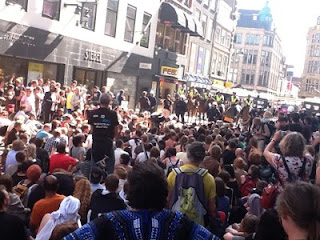A statement performed at the protest meeting at the Stedelijk Museum
Hijacking Catastrophe (2004) -Documentary
Hijacking Catastrophe: 9/11, Fear & the Selling of American Empire examines how a radical fringe of the Republican Party used the trauma of the 9/11 terror attacks to advance a pre-existing agenda to radically transform American foreign policy while rolling back civil liberties and social programs at home. The documentary places the Bush Administration's false justifications for war in Iraq within the larger context of a two-decade struggle by neoconservatives to dramatically increase military spending in the wake of the Cold War, and to expand American power globally by means of military force.
Director: Jeremy Earp and Sut Jhally
Producer: Media Education Foundation
Production Company: Media Education Foundation
Audio/Visual: sound, color
Keywords: 9/11; World Trade Center; empire; terrorism; Iraq; Bush
Contact Information: http://www.hijackingcatastrophe.org/
Producer: Media Education Foundation
Production Company: Media Education Foundation
Audio/Visual: sound, color
Keywords: 9/11; World Trade Center; empire; terrorism; Iraq; Bush
Contact Information: http://www.hijackingcatastrophe.org/
WATCH THE FULL-LENGHT MOVIE ON:
http://www.archive.org/details/HijackingCatastrophe
The Community Video Archive
Boris Groys: Art and Money
The relationship between art and money can be understood in at least two ways. First, art can be interpreted as a sum of works circulating on the art market. In this case, when we speak about art and money, we think primarily of spectacular developments in the art market that took place in recent decades: the auctions of modern and contemporary art, the huge sums that were paid for works, and so forth—what newspapers mostly report on when they want to say something about contemporary art. It is now beyond doubt that art can be seen in the context of the art market and every work of art can function as a commodity.
Published in e-flux journal, read full article:
http://www.e-flux.com/journal/view/226
Hito Steyerl: Politics of Art: Contemporary Art and the Transition to Postdemocracy
A standard way of relating politics to art assumes that art represents political issues in one way or another. But there is a much more interesting perspective: the politics of the field of art as a place of work. Simply look at what it does—not what it shows.
Published in e-flux journal, read full article:
http://www.e-flux.com/journal/view/181
Chris Burden asks for money
Make your own Welfare State or bypass it
"Hi. My name is Chris Burden. My address is 823 Ocean Front Walk, Venice, California, 90291. I can’t legally do this but let’s imagine that I asked everybody who’s listening tonight to send me money. Just, to send it directly to me. It would be such a small sacrifice for all of you and it could really do something for me. If you could just send money directly to me: Chris Burden, 823 Ocean Front Walk, Venice, California, 90291. Over the years I’ve done a number of things for you people out there in the public. I’ve done things for free. I’ve put ads on television. They all cost me money. And tonight I’m asking you to send me money. Send it directly to me. Can you imagine what a great thing this would be if it could happen."
Broadcast on KPFK, Close Radio, (recorded live) March 21, 1979, 55 min. 45 sec.
http://ubumexico.centro.org.mx/sound/close_radio/closeradio_062_Burden.mp3

